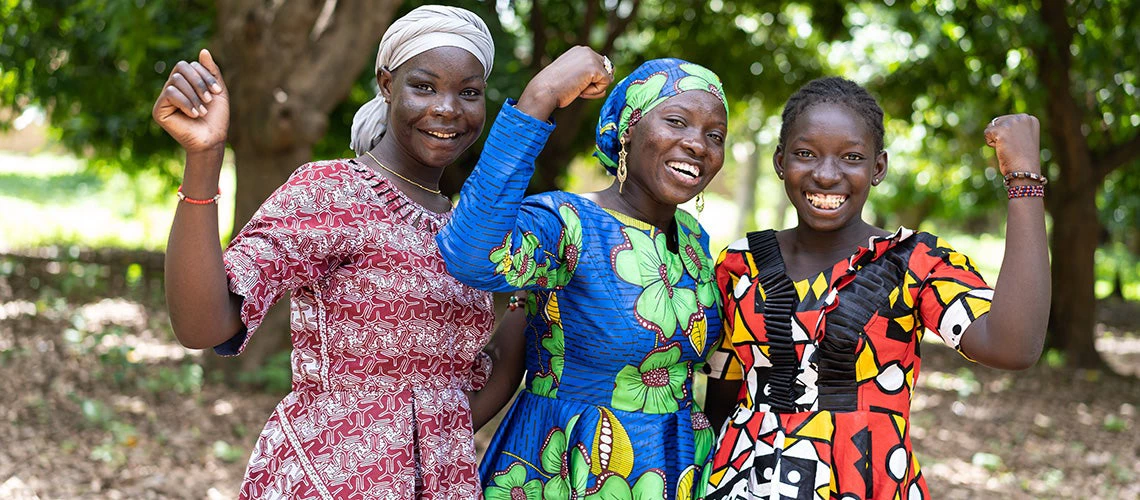 Group of young African women in colourful traditional dresses. | © shutterstock.com
Group of young African women in colourful traditional dresses. | © shutterstock.com
Sub-Saharan Africa has been making remarkable strides towards achieving legal gender equality. Between October 2021 and October 2022, seven countries in Sub-Saharan Africa implemented positive changes that have had a profound impact on women's participation in their economies.
Côte d’Ivoire and Gabon's Remarkable Achievements
Notably, Côte d’Ivoire and Gabon emerged as trailblazers, enacting multiple reforms that enhance women's access to employment and finance. These reforms include the elimination of all restrictions on women's employment, the introduction of legislation protecting women from gender-based discrimination in financial services and domestic violence, and the mandate for equal remuneration for work of equal value. For the first time, both countries have achieved a score above 90 on the World Bank’s Women, Business and the Law index, which measures equality of economic opportunity. A score of 100 indicates that women have equal rights as men, and countries scoring above 90 are typically associated with more developed economies.
Implications of the Reforms
The reforms undertaken by Côte d’Ivoire and Gabon have far-reaching implications for gender equality and women's empowerment. By eliminating restrictions on women's employment, these countries have opened up new avenues for women to pursue their professional aspirations. The legislation protecting women from gender-based discrimination in financial services and domestic violence ensures their safety and well-being. Additionally, the mandate for equal remuneration for work of equal value promotes fairness and equity in the workplace.
Africa's gender reform progress has been significantly bolstered by the collective efforts of countries and various stakeholders. Recognizing the importance of leveling the playing field and enhancing women's participation in the economy, the World Bank (WB) and the International Finance Corporation (IFC) have played a supportive role in this transformative journey.
Countries in Africa have taken significant strides in implementing legal changes that promote gender equality. These reforms have created a more enabling environment for women to participate in the economy, unlocking their potential and contributing to overall socio-economic development. By breaking down barriers and addressing discriminatory practices, these reforms have empowered women to access employment, financial services, and protection from violence and discrimination.
The ongoing commitment of countries, supported by organizations like WB and IFC, is crucial in sustaining the momentum for gender reforms. By working together, Africa is forging a path towards greater economic inclusion, where women can fully contribute to and benefit from the region's growth and development.
The promotion of gender equality and women's empowerment is of paramount importance, as it has far-reaching benefits that extend beyond individuals to families, communities, and entire nations. By striving for legal, social, and economic gender equality, we not only uplift women but also foster inclusive societies that thrive on diversity and equal opportunity.
While significant progress has been made, there is still much work to be done to ensure that women have equal economic opportunities and are free from discrimination. It is not enough to simply adopt laws and ratify treaties; their effective implementation is equally crucial. This entails enacting complementary legislation that supports the implementation of gender equality measures, establishing or improving institutional mechanisms to enforce these laws, promoting capacity building and awareness raising, and diligently monitoring outcomes.
By continuing to prioritize gender equality and women's empowerment, we can create a world where every individual has the opportunity to thrive. This requires sustained commitment from governments, civil society organizations, and individuals alike. Together, we can break down barriers, challenge societal norms, and create an environment where women can fully participate in and contribute to all aspects of society.
In this journey towards gender equality, it is essential to recognize that empowering women is not a zero-sum game. When women are empowered, societies as a whole benefit from their talents, skills, and perspectives. By embracing gender equality, we unlock the full potential of half the population, leading to greater innovation, economic growth, and social progress.
Let us continue to champion gender equality and women's empowerment, working hand in hand to build a more inclusive, just, and prosperous world for all. Together, we can create a future where every individual, regardless of gender, has the opportunity to thrive and contribute to a better tomorrow.



Join the Conversation